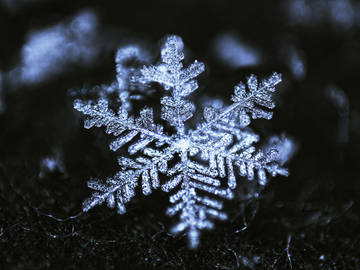Though snow has long been a feature of the natural world in some climes at some times, current available evidence of the word snowflake dates it only to the early 18th century. Flakes and crystals of snow existed long before then, of course, but they were known by such charming words as flother and flaw and flaucht.

In Missouri in the early 1860s, a 'snowflake' was a person who was opposed to the abolition of slavery—the implication of the name being that such people valued white people over black people. This use seems not to have endured.
Those words fell out of use while snowflake settled into the lexicon with its hushed and lovely literal meaning. In recent times, though, the word has been causing a ruckus. It's developed a new and decidedly less pleasant use as a disparaging term for a person who is seen as overly sensitive and fragile. In the lead-up to the 2016 U.S. elections it was lobbed especially fiercely by those on the right side of the political spectrum at those on the left. And the snowball fight has continued since.
There were glimmers of this use in the decade and a half that preceded that election, but the meaning at first was a bit softer, referring mostly to millennials who were allegedly too convinced of their own status as special and unique people to be able (or bothered) to handle the normal trials and travails of regular adult life.
That use very likely has its genesis in Chuck Palahniuk's 1996 cult-favorite book Fight Club, in which a member of the anti-consumerist Project Mayhem tells the other members:
"You are not a beautiful and unique snowflake. You are the same decaying organic matter as everyone, and we are all part of the same compost pile."
In the 1999 movie adaptation the lines go like this:
“Listen up, maggots. You are not special. You are not the beautiful or unique snowflake. You are the same decaying organic matter as everything else. We are the all-singing, all-dancing crap of the world. We are all part of the same compost heap."
Palahniuk was hardly the first person to use the metaphor. It's the stuff of self-help books and inspirational posters and elementary school assurances. The imagery before negation is lovely; we are each unique snowflakes, each worth treasuring because each is uniquely beautiful. Palahniuk's denial of the individual's snowflake status struck a chord.
It's not the first time snowflake has veered from the natural world to the world of slang. In the 1970s snowflake was a disparaging term for a white man or for a black man who was seen as acting white. It was also used as a slang term for cocaine. But before either of those it was used for a time with a very particular political meaning.
In Missouri in the early 1860s, a "Snowflake" was a person who was opposed to the abolition of slavery—the implication of the name being that such people valued white people over black people. The Snowflakes hoped slavery would survive the country's civil war, and were contrasted with two other groups. The Claybanks (whose name came from the colorless color of the local terrestrial clay) wanted a gradual transition out of slavery for slaves, with eventual freedom accompanied by compensation to slave owners; the Charcoals—who were also called Brown Radicals—wanted immediate emancipation and for black people to be able to enlist in the armed forces.
The available evidence suggests that this particular use of snowflake never moved much beyond the borders of Missouri or the era.
What remains to be seen is whether or not the recent use of snowflake will be similarly short-lived. We're betting the use isn't as unique as that.
Words We're Watching talks about words we are increasingly seeing in use but that have not yet met our criteria for entry.
Sources:
L. U. Reavis, St. Louis: The Future Great City of the World (St. Louis: C. R. Barns, 1876), 235.
William Earl Parrish, A History of Missouri: Volume III 1860 to 1875 (Columbia: University of Missouri Press, (1973) 2001), 94.




